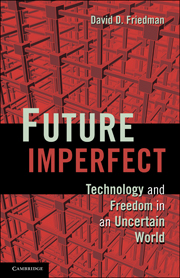Book contents
- Frontmatter
- Contents
- PART ONE PROLOGUE
- PART TWO PRIVACY AND TECHNOLOGY
- PART THREE DOING BUSINESS ONLINE
- PART FOUR CRIME AND CONTROL
- PART FIVE BIOTECHNOLOGIES
- PART SIX THE REAL SCIENCE FICTION
- 17 The Last Lethal Disease
- 18 Very Small Legos
- 19 Dangerous Company
- 20 All in Your Mind
- 21 The Final Frontier
- 22 Interesting Times
- Notes
- Bibliography
- Index
19 - Dangerous Company
Published online by Cambridge University Press: 18 August 2009
- Frontmatter
- Contents
- PART ONE PROLOGUE
- PART TWO PRIVACY AND TECHNOLOGY
- PART THREE DOING BUSINESS ONLINE
- PART FOUR CRIME AND CONTROL
- PART FIVE BIOTECHNOLOGIES
- PART SIX THE REAL SCIENCE FICTION
- 17 The Last Lethal Disease
- 18 Very Small Legos
- 19 Dangerous Company
- 20 All in Your Mind
- 21 The Final Frontier
- 22 Interesting Times
- Notes
- Bibliography
- Index
Summary
The specialness of humanity is found only between our ears; if you go looking for it anywhere else, you'll be disappointed.
Lee SilverWhat I am and where in my body I am located is a very old puzzle. An early attempt to answer it by experiment is described in Jomsviking saga, written in the thirteenth century. After a battle, captured warriors are being executed. One of them suggests that the occasion provides the perfect opportunity to settle an ongoing argument about the location of consciousness. He will hold a small knife point down while the executioner cuts off his head with a sharp sword; as soon as his head is off, he will try to turn the knife point up. It takes a few seconds for a man to die, so if his consciousness is in his body he will succeed; if it is in his head, no longer attached to his body, it will fail. The experiment goes as proposed; the knife falls point down.
We still do not know with much confidence what consciousness is, but we know more about the subject than the Jomsvikings did. It seems clear that it is closely connected to the brain. A programmed computer acts more like a human mind than anything else whose working we understand. And we know enough about the mechanism of the brain to plausibly interpret it as an organic computer.
- Type
- Chapter
- Information
- Future ImperfectTechnology and Freedom in an Uncertain World, pp. 275 - 280Publisher: Cambridge University PressPrint publication year: 2008



